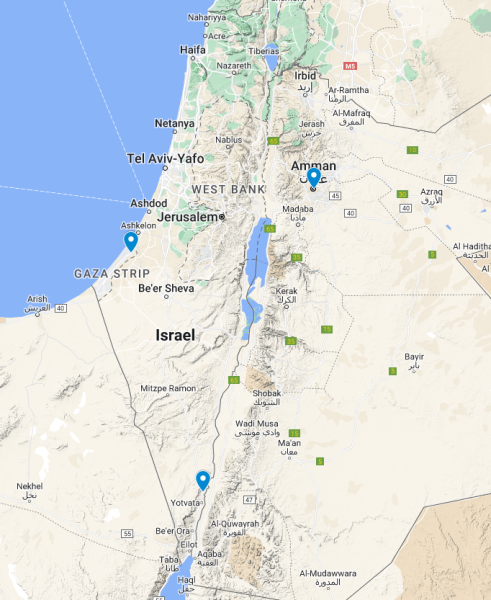Israeli Drone Strike
Isfahan, a city in Iran, was the target of a drone attack on Saturday, Jan. 28. The attack was later confirmed to be conducted by Israel’s intelligence agency, the Mossad, according to The New York Times.
The Times reported that the target was a military facility, though could not confirm the purpose of the attack. Associate Professor of Political Science Shanna Kirschner said that while the international audience is unclear of the result, she is positive that the Israeli government knows exactly what it hit, as the Mossad is one of the best intelligence services in the world and has conducted similar activity in the past.
“These drone attacks last week are an escalation if we think about it in the sweep of the last few years — maybe they’re attacking scientists, maybe they’re embedding a computer virus that knocks all the centrifuges offline, but I think it’s consistent with the larger policy,” Kirschner said.
The attack is best understood through the lens of the past 50 to 60 years of Israel’s nuclear policy, according to Kirschner.
“Israel has long pursued a policy of — we sometimes call it ‘ambiguity’ around their own nuclear program,” Kirschner said. “So the idea is kind of (to) make sure everybody knows you have a nuclear program, but don’t actually come out and talk about it.”
Beyond Israel’s own nuclear progress is the concern that surrounding, deeply hostile states get their own nuclear capabilities, Kirschner explained.
“Regardless of what else you might think about regional politics, this is a reasonable concern given the rhetoric that is emanating from states like Iraq under Saddam Hussein, like Iran, like Syria,” Kirschner said. “Part of the Israeli policy for the last many decades is to, when there is a state that they view as particularly hostile, that is pursuing nuclear or in some cases other weapons of mass destruction — like chemical weapons — to try to set those programs back. And if diplomacy is not working, they will pursue military action.”
Israel’s vigorous defense of its own borders dates back to the state’s formation in 1948, according to Assistant Professor of History Brian Miller, who teaches courses on Middle Eastern history. Since it was formed, the state of Israel has maintained the right to defend itself from surrounding nations, which has only benefited from the special relationship Israel has with the United States.
Miller pointed toward a more recent probable cause of Israel’s escalation against Iran.
“I think that this latest drone attack probably — although we don’t have conclusive proof of exactly what was at the site — but I think that it comes out of the falling apart of the 2015 nuclear agreement where Iran had indicated that they would drop pursuing, developing weaponized nuclear technology.”
The 2015 deal Miller referred to — known formally as the “Joint Comprehensive Plan of Action” and informally as the Iran nuclear deal — led to the dismantling of “much of its nuclear program and (opening of) its facilities to more extensive international inspections in exchange for billions of dollars’ worth of sanctions relief,” according to the Council on Foreign Relations. Since former President Donald Trump withdrew the U.S. from the deal in 2018, it has been in jeopardy and Iran has renewed some nuclear activity.
“From the Israeli perspective, this is coming from a regime that has repeatedly called for Israel’s destruction,” Kirschner said. “So the fear that that regime really gets functional nuclear weapons is an existential fear, and I think that there’s a lot of debate within Israeli political and military circles about what is the appropriate response to that.”
Miller said that, currently, any nuclear activity Iran conducts is claimed to be for energy purposes. He explained that it is possible Iran is operating in vagueness in an attempt to reduce future sanctions against themselves, allowing a nuclear energy program to continue being developed. Still, he explained that this is not the general position of both the U.S. and Israeli governments.
This sentiment was echoed by Veronica Green, ’23, who explained this situation as an example of brinkmanship — both sides escalating until war breaks out. Green, a political science major, explained that Iran and Israel have been going back and forth for years building up their nuclear weapons.
Green also commented on the unique relationship between the United States and Israel. Despite not having prior knowledge of this attack and several others like it, Green believes that the United States will continue to support Israel no matter what, even though other sources explain how these actions have earned the ire of the U.S.
“There’s a really strong militaristic connection between the United States and Israel, and it’s one of the few footings that the United States has in the Middle East,” Green said. “It is likely (the attacks) will not have much of an impact besides the United States kind of being like that disappointed father, like, ‘Why don’t you tell me?’”
Ray Colabawalla, ’25, critiqued this relationship and the special treatment that Israel receives. Born in Qatar, Colabawalla moved to the United Arab Emirates during his childhood, leading him to be more skeptical of Israel.
“It really is a ballsy move from Israel’s perspective,” Colabawalla said. “You’re not only violating the airspace of Iran, you’re violating the airspace of all of these (Middle Eastern) countries, because they definitely would not allow you to go ahead with it.”
As for Iran’s response, Colabwalla does not anticipate a direct attack. Rather, he believes that they will use proxy militant groups such as Hasbulla to get back at Israel.
“The U.S. has got your back on the world stage,” Colabwalla said. “Nobody’s gonna stop big trade with Israel. Nobody’s gonna sanction Israel for this. But if Iran were to do the same, they will see an increase in sanctions and stuff like that.”

Roman Hladio is a senior from Wexford, Pennsylvania. He is studying English with a creative writing emphasis, and completing requirements for a Journalism...

Caroline Maye is a first year from Chicago, Illinois. She plans to major in Political Science or History with a minor in Journalism in the Public Interest....








